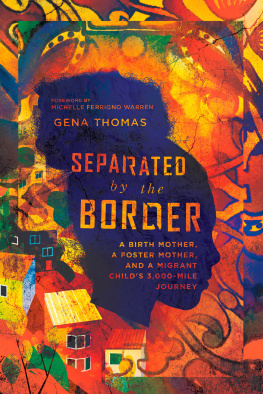I n May 2018, stories of families being separated at the United States southern border were beginning to make headlines because of the governments new zero-tolerance policy for asylum seekers. Online outrage was small but fierce. In true Twitter fashion, those of us working closely with congressional leaders and the administration, pushing for just responses to migrants, began to get tagged. Questions like, How can this be happening? and, What can we do to make this stop? were filling my Twitter feed.
Having worked alongside immigrants for years, I was caught off-guard that so many people were taking notice and wanting change. In reality, separating families is not new, so seeing people waking up to this injustice was very welcome.
My own immigration story is one of a young Italian couple heading to the United States via Ellis Island at the turn of the twentieth century to get jobs and send money back to their family, who had fewer opportunities to support those they loved. As for many immigrants, their goodbye was permanent. In recent decades, our countrys immigration system has compounded the harm, indefinitely separating families through public policy in a myriad of ways.
Families around the world daily make hard choices for the best of those they love. They leave their families, moving for jobs to support aging parents and hungry children. They know that if they leave and succeed, none of them will be able to return home legally. Americas economic engine needs more workers than our labor markets can fill, so were quick to offer the undocumented opportunitiesmany in fields in which Americans dont want to workso our lives can move forward without economic disruption.
US citizens dont realize the trauma and separation that befall those who pick our food, cut our lawns, staff our restaurants, clean our hotel rooms. This keeps our economy going, sustaining the age-old adage We want your work; we just dont want you.
Economic pushes and pulls arent the only driver of family separation. In 2014, thousands of children came to our borders fleeing violence. Gangs had killed their family members and recruited their friends, so their only option to stay alive was to head north as unaccompanied minors. These factors are still a primary driver for many in migrant caravans awaiting the opportunity to share their fears with US officials and be granted asylum.
Family separation is also an issue for children. Those born to undocumented parents often suffer the pain and trauma of having parents deported, not to mention of living under that threat. Over eight million US citizens live with that fear for at least one family member, and according to the American Immigration Council, almost six million citizen children under the age of eighteen live with a parent or family member who is undocumented.
Then there are undocumented immigrants who were brought to the United States as children: the Dreamers. They learned the Pledge of Allegiance, were educated in our schools, and contribute to our communities. They are in every way American, yet they lack the opportunity to move their legal status forward. Many Dreamers have a temporary protected status called Deferred Action for Childhood Arrivals (DACA). This status protects them from deportation, but DACA students continue to be used as political pawns in an ugly partisan game. So they wait for the opportunity to move from mere protection to the ability to earn legal status.
These examples make headlines in our news, yet most Americans, especially Christian Americans, seem to pay little attention. So in May 2018, when news broke about families who were coming to our borders, seeking asylum, and being separated, I assumed it would be just another day of tragic brokenness perpetuated and once again going unnoticed. But that was not the case. Multiple streams of response and outrage were expressed. And numerous groups lifted up stories, including the unique stories of Christian mothers.
The issue was finally making its way to the top of the noise. American mothers created photos of themselves and their children with #FamiliesBelongTogether and #NotWithoutMyChild and sent them to public officials via social media, calling for an end to family separation at the border.
On June 20, the backlash from the American peoplemost specifically the church people, as referred to by the US attorney generalwas so great the administration stopped the policy. Those who were new to the immigration policy game cheered and celebrated their collective success. Those of us who had been pushing back on the issues month after month were shocked. Something had worked. We saw that when enough voices with enough outrage and persistence say, Enough, the madness can stop.
Voices were beginning to rise to the top on social media, and I repeatedly found myself drawn to the voice of Gena Thomas. Her posts were insightful and stirring. She had a unique voice that was unlike others, and I wanted to know a bit more of her story. I direct-messaged her on Twitter, and we talked on the phone. I learned how she had experienced the family separation policy as a foster mother and how shed reunited that daughter, Julia, with her mother in Honduras. I was captivated by the way the Lord had carefully put Julia into Genas arms to care for her and to get her back home. Such an articulate, deeply passionate, and gifted woman said yes to having a foster daughter and experienced firsthand what would become a global outrage: children being torn from their parents arms for following asylum laws.
Around the time Gena and I had our first phone call, I was asked to lead a group of evangelical women to the Texas border. As I spoke with Gena, it took only a few minutes to know that I wanted her to come with us. She joined our group and visited the very places Julia had been. She walked through the facilities with chainlink cages and saw hundreds of asylum seekers sitting on concrete floors and wrapped in Mylar blankets, waiting to learn their fate. She met amazing faith leaders such as Sister Norma Pimentel of Catholic Charities working tirelessly to meet the physical needs of families seeking asylum. She talked with US Customs and Border Protection agents, whose humanity we needed to see in spite of our frustrations with the policies they were there to implement.
















